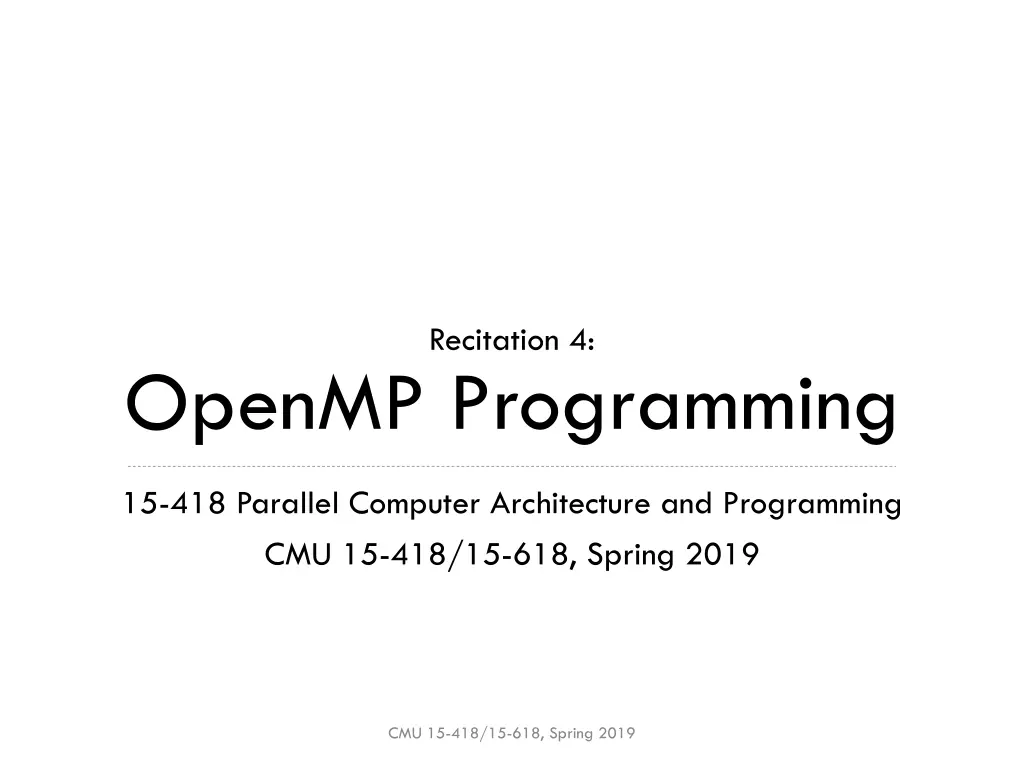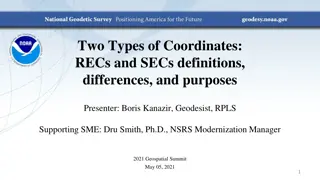
Efficient OpenMP Programming for Parallel Matrix-Vector Multiplication
Learn how to optimize matrix-vector multiplication using OpenMP in this detailed guide. Explore sparse matrix formats, array sum parallelization, and more complex examples. Develop a deeper understanding of parallel computing with practical implementations and expert guidance from CMU's 15-418/15-618 course.
Download Presentation

Please find below an Image/Link to download the presentation.
The content on the website is provided AS IS for your information and personal use only. It may not be sold, licensed, or shared on other websites without obtaining consent from the author. If you encounter any issues during the download, it is possible that the publisher has removed the file from their server.
You are allowed to download the files provided on this website for personal or commercial use, subject to the condition that they are used lawfully. All files are the property of their respective owners.
The content on the website is provided AS IS for your information and personal use only. It may not be sold, licensed, or shared on other websites without obtaining consent from the author.
E N D
Presentation Transcript
Recitation 4: OpenMP Programming 15-418 Parallel Computer Architecture and Programming CMU 15-418/15-618, Spring 2019 CMU 15-418/15-618, Spring 2019
Goals for today Learn to use Open MP 1. Sparse matrix-vector code Understand CSR sparse matrix format Simplest OpenMP features 2. Parallelize array sum via OpenMP reductions 3. Parallelize radix sort More complex OpenMP example Most of all, ANSWER YOUR QUESTIONS! CMU 15-418/15-618, Spring 2019
Matrix-matrix multiplication Recall from recitation 2... (?,?) (?,?) ? (?,?) C A B CMU 15-418/15-618, Spring 2019
Matrix-matrix multiplication (matmul) Simple C++ implementation: /* Find element based on row-major ordering */ #define RM(r, c, width) ((r) * (width) + (c)) // Standard multiplication void multMatrixSimple(int N, float *matA, float *matB, float *matC) { for (int i = 0; i < N; i++) for (int j = 0; j < N; j++) { float sum = 0.0; for (int k = 0; k < N; k++) sum += matA[RM(i,k,N)] * matB[RM(k,j,N)]; matC[RM(i,j,N)] = sum; } } CMU 15-418/15-618, Spring 2019
Today: Matrix-vector multiplication (?,?) (?,?) ? (?,?) C A B ? ? ? 1 (? 1) output vector Output = dot-products of rows from A and the vector B CMU 15-418/15-618, Spring 2019
Matrix-vector multiplication Simple C++ implementation (discards ? loop from matmul): /* Find element based on row-major ordering */ #define RM(r, c, width) ((r) * (width) + (c)) void matrixVectorProduct(int N, float *matA, float *vecB, float *vecC) { for (int i = 0; i < N; i++) float sum = 0.0; for (int k = 0; k < N; k++) sum += matA[RM(i,k,N)] * vecB[k]; vecC[i] = sum; } } CMU 15-418/15-618, Spring 2019
Matrix-vector multiplication Our code is slightly refactored: float rvp_dense_seq(dense_t *m, vec_t *x, index_t r) { index_t nrow = m->nrow; index_t idx = r*nrow; float val = 0.0; for (index_t c = 0; c < nrow; c++) val += x->value[c] * m->value[idx++]; return val; } Row dot product (the inner loop over ? in original code) void mvp_dense_seq(dense_t *m, vec_t *x, vec_t *y, rvp_dense_t rp_fun) { index_t nrow = m->nrow; for (index_t r = 0; r < nrow; r++) { y->value[r] = rp_fun(m, x, r); } } The inner loop over rows (over ? in original code) CMU 15-418/15-618, Spring 2019
Benchmarking dense mat-vec $ ./mrun -l 3 -d 10 -t r D Dense 3 10 MVP RVP GF seq seq 0.12 r 0.12 GFLops machine capable of 6.4 Gflops This is bad performance Why? We are only counting non-zero entries of matrix CMU 15-418/15-618, Spring 2019
Sparse matrix-vector multiplication What if A is mostly zeroes? (This is common) (?,?) (?,?) ? (?,?) C A B Idea: We should only compute on non-zeros in A Need new sparse matrix representation CMU 15-418/15-618, Spring 2019
Compressed sparse-row (CSR) matrix format Row Dense matrix: CSR matrix: CMU 15-418/15-618, Spring 2019
Compressed sparse-row (CSR) matrix format Row Dense matrix: 6 1 1 2 9 2 4 3 CSR matrix: CMU 15-418/15-618, Spring 2019
Compressed sparse-row (CSR) matrix format Row Dense matrix: 6 1 1 2 9 2 4 3 CSR matrix: Values: (Compact non-zeroes into dense format) 6 2 4 1 2 9 3 1 CMU 15-418/15-618, Spring 2019
Compressed sparse-row (CSR) matrix format Row Dense matrix: 6 1 1 2 9 2 4 3 CSR matrix: Values: 6 2 4 1 2 9 3 1 Indices: 1 (Position corresponding to each value) CMU 15-418/15-618, Spring 2019
Compressed sparse-row (CSR) matrix format Row Dense matrix: 6 1 1 2 9 2 4 3 CSR matrix: Values: 6 2 4 1 2 9 3 1 Indices: 1 5 (Position corresponding to each value) CMU 15-418/15-618, Spring 2019
Compressed sparse-row (CSR) matrix format Row Dense matrix: 6 1 1 2 9 2 4 3 CSR matrix: Values: 6 2 4 1 2 9 3 1 Indices: 1 5 0 (Position corresponding to each value) CMU 15-418/15-618, Spring 2019
Compressed sparse-row (CSR) matrix format Row Dense matrix: 6 1 1 2 9 2 4 3 CSR matrix: Values: 6 2 4 1 2 9 3 1 Indices: 1 5 0 3 (Position corresponding to each value) CMU 15-418/15-618, Spring 2019
Compressed sparse-row (CSR) matrix format Row Dense matrix: 6 1 1 2 9 2 4 3 CSR matrix: Values: 6 2 4 1 2 9 3 1 Indices: 1 5 0 3 7 4 1 6 (Position corresponding to each value) CMU 15-418/15-618, Spring 2019
Compressed sparse-row (CSR) matrix format Row Dense matrix: 6 1 1 2 9 2 4 3 CSR matrix: Values: 6 2 4 1 2 9 3 1 Indices: 1 5 0 3 7 4 1 6 Offsets: (Where each row starts) CMU 15-418/15-618, Spring 2019
Compressed sparse-row (CSR) matrix format Row Dense matrix: 6 1 1 2 9 2 4 3 CSR matrix: Values: 6 2 4 1 2 9 3 1 Indices: 1 5 0 3 7 4 1 6 Offsets: 0 (Where each row starts) CMU 15-418/15-618, Spring 2019
Compressed sparse-row (CSR) matrix format Row Dense matrix: 6 1 1 2 9 2 4 3 CSR matrix: Values: 6 2 4 1 2 9 3 1 Indices: 1 5 0 3 7 4 1 6 Offsets: 0 2 (Where each row starts) CMU 15-418/15-618, Spring 2019
Compressed sparse-row (CSR) matrix format Row Dense matrix: 6 1 1 2 9 2 4 3 CSR matrix: Values: 6 2 4 1 2 9 3 1 Indices: 1 5 0 3 7 4 1 6 Offsets: (Where each row starts) 0 2 5 CMU 15-418/15-618, Spring 2019
Compressed sparse-row (CSR) matrix format Row Dense matrix: 6 1 1 2 9 2 4 3 CSR matrix: Values: 6 2 4 1 2 9 3 1 Indices: 1 5 0 3 7 4 1 6 Offsets: (Where each row starts) 0 2 5 6 CMU 15-418/15-618, Spring 2019
Compressed sparse-row (CSR) matrix format Row Dense matrix: 6 1 1 2 9 2 4 3 CSR matrix: Values: 6 2 4 1 2 9 3 1 Indices: 1 5 0 3 7 4 1 6 Offsets: (Where each row starts) 0 2 5 6 8 CMU 15-418/15-618, Spring 2019
Compressed sparse-row (CSR) matrix format Row Dense matrix: 6 1 1 2 9 2 4 3 CSR matrix: Values: (Compact non-zeroes into dense format) 6 2 4 1 2 9 3 1 Indices: (Position corresponding to each value) 1 5 0 3 7 4 1 6 Offsets: (Where each row starts) 0 2 5 6 8 CMU 15-418/15-618, Spring 2019
Sparse matrix-vector multiplication (spmv) float rvp_csr_seq(csr_t *m, vec_t *x, index_t r) { index_t idxmin = m->rowstart[r]; index_t idxmax = m->rowstart[r+1]; /* 1. get indices from offsets */ float val = 0.0; for (index_t idx = idxmin; idx < idxmax; idx++) { /* 2. iterate over row */ index_t c = m->cindex[idx]; /* 3. find corresponding index in vector */ data_t mval = m->value[idx]; /* read matrix (using idx) */ data_t xval = x->value[c]; /* read vector (using c) */ val += mval * xval; } return val; } /* the outer loop (across rows) doesn t change */ void mvp_csr_seq(csr_t *m, vec_t *x, vec_t *y, rvp_csr_t rp_fun) { index_t nrow = m->nrow; for (index_t r = 0; r < nrow; r++) { y->value[r] = rp_fun(m, x, r); } } CMU 15-418/15-618, Spring 2019
Benchmarking dense mat-vec $ ./mrun -l 3 -d 10 -t r D Dense 3 10 MVP RVP GF seq seq 0.12 r CMU 15-418/15-618, Spring 2019
Benchmarking spmv $ ./mrun -l 3 -d 10 -t r Sparse 3 MVP RVP GF seq seq 1.15 10 r This matrix is 10% dense (-d parameter) CSR gives 9.6 speedup! CMU 15-418/15-618, Spring 2019
Lets optimize this code! Exploit parallelism at multiple levels To properly measure parallel speedup, need to start from an optimized baseline ILP SIMD Threads CMU 15-418/15-618, Spring 2019
Whats the ILP of spmv? GHC machines: 2x LD @ 1 cycle & 2x FMA @ 3 cycle Q: How many operations per iteration? A: 3 loads, 1 FMA Iteration takes at least: 3 cycles (latency bound) 3.2 ??? 3 ?????? ??? ?????????= 1.07 ?????? Pretty close to what we observe Machine utilization low: FMA 17%, LD 50% Expected: CMU 15-418/15-618, Spring 2019
Improving spmv ILP Note: gcc with O3 will unroll these loops for us #define UNROLL 3 float rvp_csr_par(csr_t *m, vec_t *x, index_t r) { index_t idxmin = m->rowstart[r], idxmax = m->rowstart[r+1]; index_t idx; float uval[UNROLL]; float val = 0.0; for (index_t i = 0; i < UNROLL; i++) uval[i] = 0.0; for (idx = idxmin; idx+UNROLL <= idxmax; idx+=UNROLL) { for (index_t i = 0; i < UNROLL; i++) { index_t c = m->cindex[idx+i]; data_t mval = m->value[idx+i]; data_t xval = x->value[c]; uval[i] += mval * xval; } } for (; idx < idxmax; idx ++) { index_t c = m->cindex[idx]; data_t mval = m->value[idx]; data_t xval = x->value[c]; val += mval * xval; } Accumulate elements mod UNROLL in uval array for (index_t i = 0; i < UNROLL; i++) val += uval[i]; return val; } Return sum of uval array CMU 15-418/15-618, Spring 2019
Benchmarking spmv $ ./mrun -l 4 -d 10 -t r Sparse 4 MVP RVP GF seq seq 1.40 10 r CMU 15-418/15-618, Spring 2019
Benchmarking unrolled spmv $ ./mrun l 4 d 10 -t r Sparse 4 MVP RVP GF seq seq 1.40 seq par 2.72 10 r 3 unrolling gives 2 speedup More unrolling doesn t help (3 slightly better than 2) Why?With 100% hits, LD utilization = 100% when unrolled twice Unrolling thrice helps a bit, probably by hiding misses on sparse vector loads CMU 15-418/15-618, Spring 2019
Lets optimize this code! Exploit parallelism at multiple levels ILP SIMD Threads CMU 15-418/15-618, Spring 2019
Thread parallelism with OpenMP OpenMP is supported by gcc Decorate your code with #pragmas We will cover only a few of OpenMP s features CMU 15-418/15-618, Spring 2019
Parallelizing spmv with OpenMP Focus on the outer loop void mvp_csr_seq(csr_t *m, vec_t *x, vec_t *y, rvp_csr_t rp_fun) { index_t nrow = m->nrow; for (index_t r = 0; r < nrow; r++) { y->value[r] = rp_fun(m, x, r); } } CMU 15-418/15-618, Spring 2019
Parallelizing spmv with OpenMP Focus on the outer loop void mvp_csr_mps(csr_t *m, vec_t *x, vec_t *y, rvp_csr_t rp_fun) { index_t nrow = m->nrow; #pragma omp parallel for schedule(static) for (index_t r = 0; r < nrow; r++) { y->value[r] = rp_fun(m, x, r); } } schedule(static) divides loop statically across system cores (including hyperthreads) CMU 15-418/15-618, Spring 2019
Benchmarking threaded spmv $ ./mrun l 4 d 10 -t r Sparse 4 MVP RVP GF seq seq 1.40 seq par 2.72 ... mps seq 9.92 mps par 10.44 10 r Threading gives 7 for naive, 4 for unrolled We have 8x2-hyperthread = 16 cores CMU 15-418/15-618, Spring 2019
Analyzing poor threading performance Sources of poor parallel speedup: No, static work division is zero overhead Communication/synchronization? Not execution units mps/seq has poor FMA utilization, and mps/par only gets 4 speedup from 8 cores Throughput limitations? Load imbalance? Maybe how many elements are there per row? A: its random CMU 15-418/15-618, Spring 2019
Benchmarking threaded spmv $ ./mrun l 4 d 10 -t s Sparse 4 MVP RVP seq seq seq par ... mps seq mps par 10 GF 1.40 3.30 s 2.10 4.24 Increasing skew (all non-zero elements are in first 10% of rows) reduces speedup significantly Single-thread is faster (why?), OpenMP is slower (why?) CMU 15-418/15-618, Spring 2019
Benchmarking threaded spmv $ ./mrun l 4 d 10 -t u Sparse 4 MVP RVP seq seq seq par ... mps seq mps par 10 GF 1.45 2.63 u 10.08 10.51 But forcing all rows to have the same number of non- zero elements doesn t change much vs. random Hypothesis: Memory bandwidth saturated? CMU 15-418/15-618, Spring 2019
Parallelizing spmv with OpenMP Dealing with skewed workloads void mvp_csr_mps(csr_t *m, vec_t *x, vec_t *y, rvp_csr_t rp_fun) { index_t nrow = m->nrow; #pragma omp parallel for schedule(static) for (index_t r = 0; r < nrow; r++) { y->value[r] = rp_fun(m, x, r); } } CMU 15-418/15-618, Spring 2019
Parallelizing spmv with OpenMP Dealing with skewed workloads void mvp_csr_mps(csr_t *m, vec_t *x, vec_t *y, rvp_csr_t rp_fun) { index_t nrow = m->nrow; #pragma omp parallel for schedule(dynamic) for (index_t r = 0; r < nrow; r++) { y->value[r] = rp_fun(m, x, r); } } schedule(dynamic) divides loop into many small chunks and load balances them across threads CMU 15-418/15-618, Spring 2019
Benchmarking threaded spmv $ ./mrun l 4 d 10 -t s Sparse 4 MVP RVP GF seq seq 1.36 seq par 3.17 ... mpd seq 8.05 mpd par 8.24 10 s Dynamic scheduling increases performance on heavily skewed workloads CMU 15-418/15-618, Spring 2019
Benchmarking threaded spmv $ ./mrun l 4 d 10 -t r Sparse 4 MVP RVP GF seq seq 1.36 seq par 3.17 ... mpd seq 10.52 mpd par 11.24 10 r And some on slightly skewed workloads CMU 15-418/15-618, Spring 2019
Lets optimize this code! Exploit parallelism at multiple levels ILP SIMD Threads There s code for this in the tar, but I m not going to talk about it CMU 15-418/15-618, Spring 2019
Example: Summing an array double sum_array(double *d, int n) { int i; double sum = 0.0; for (i = 0; i < n ; i++) { double val = d[i]; sum += val; } return sum; } CMU 15-418/15-618, Spring 2019
Parallelizing array sum w/ OpenMP (Attempt #1) double sum_array(double *d, int n) { int i; double sum = 0.0; #pragma omp parallel for schedule(static) for (i = 0; i < n ; i++) { double val = d[i]; sum += val; } return sum; } Q: Is this OK? A: No, concurrent updates to sum CMU 15-418/15-618, Spring 2019
Parallelizing array sum w/ OpenMP (Attempt #2) double sum_array(double *d, int n) { int i; double sum = 0.0; #pragma omp parallel for schedule(static) for (i = 0; i < n ; i++) { double val = d[i]; #pragma omp critical sum += val; } return sum; } Q: Is this OK? A: Its correct, but won t speedup (threads serialize) CMU 15-418/15-618, Spring 2019
Parallelizing array sum w/ OpenMP (Attempt #3) double sum_array(double *d, int n) { int i; double sum = 0.0; #pragma omp parallel for schedule(static) for (i = 0; i < n ; i++) { double val = d[i]; __sync_fetch_and_add(&sum, val); } return sum; } GCC __sync_* intrinsics compile to x86 atomic instructions (vs. locks for #pragma omp critical) Faster, but threads still serialize! CMU 15-418/15-618, Spring 2019
Parallelizing array sum w/ OpenMP (Attempt #4) double sum_array(double *d, int n) { int i; double sum = 0.0; #pragma omp parallel for schedule(static) \ reduction (+:sum) for (i = 0; i < n ; i++) { double val = d[i]; sum += val; } return sum; } OpenMP has specialized support for this pattern Syntax: (???????:????????) CMU 15-418/15-618, Spring 2019



















